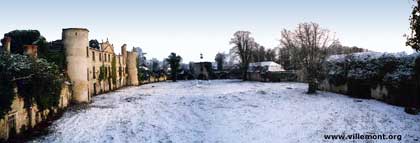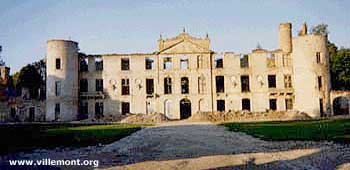
AUVERGNE


Allier |
Cantal |
Haute Loire |
Puy de Dôme |
Other regions & other castles |
Previous months’ selections |
| Castle of Villemont |
|
|
The castle of Villemont, in Auvergne, was in the beginning a modest field qualified at the beginning of XVIe century of "House, mound, ditch, low court of Villemont". It depended on the County of Montpensier belonging to the Constable of Bourbon then and was confiscated by François 1st who then made pay to the Constable the price of his treason. Fallen in Michel of VEYNY, nephew of the Duprat Chancellor, it will remain in the same family (descent by the women) until A her sale in 1958, a little before the fire which will destroy it. The first significant construction is thus the work of Michel of VEYNY. It is then a building in L, flanked on its frontage, directed in the South, of 2 capped towers of roof conical. In the south always are gardens with the Frenchwoman tandisqu' in north leave the star rides. It is about a richly furnished house (Tapestry, fourposter beds, object of orfervrery, decorations out of gilded leather) which will receive, in 1566, the visit of the king Charles IX accompanied by its mother, the queen Catherine de Médicis and of the Michel Chancellor of Hospital. The VEYNY, owners of Villemont, thrive throughout XVIIe century, are illustrated in the armies, the Church and are made provide with wire father for the load of baillif of the old county become duchy of Montpensier. The seigneurery of Villemont is érigèe in marquisat, in 1720 by the regent. In 1740, it belongs to Gilbert de Veyny "Mestre de Cavalerie" and to manufacturer of the current castle whose legend wants that in disgrace of the court of Louis XV, he would have made build the immense unit that one connait today to place his regiment there. The Revolution and the beginning of the XIXe century correspond to one period of decline during which the heirs to Gilbert de Veyny tear in one procés successional which will finish only in 1846. During all this time, badly maintained, the castle is degraded. It is only in second half of the XIXe century that is committed a very significant restoration: to this time all the decorations in stucco go back (Framing of windows and doors, ailerons of attic windows, balustrades of balconies, planks in reliefs surlignant the arcs, medallions and busts of the frontage, etc...). It is as at this time as the roofs of the turns are remade à.la.mode medieval: in pepper plantation, while, the construction of XVIIIe had more elegantly carried them out in the shape of domes with lantern. After the revolutionary decline of the décénies post and the recovery then the splendour of the XIXe Century, came one second period, if it is not of delaissement, at least from minimum maintenance since Henri Pourrat will write at the beginning of year 58 in the work which it devoted to the castles in Auvergne:"Il would be necessary today 4 million to prevent the roofs of Villemont from collapsing " The castle was sold at the end of May 1958 by its last owner, downward heiress direct of the VEYNY. One month later in the night from the 3 to July 4, it blazed up and burned de.toutes.parts. Nearly forty years after it will sink in a state of ruin advanced before reappearing again thanks to a rescue in extremis. |
|
Castle of the month : |
Search |
For any question concerning this Web site, send a message to webmaster


 According
to the method recommended at the time by the architect Philibert
Delorme to extend and regularize a building médièval,
it makes increase by developing it the southern frontage; the large
main building, removed from its Western tower, demolished, is lengthened
and another tower identical to that preserved at the East is built
with the extremity; a Western wing is built, with the back, identical
of the wing Is existing. The commun runs, imposing, were then carried
out with a horseshoe scheduling locking up a large main courtyard;
avenues bordered of 4 rows of walnut trees are traced out of star
around the Castle; the neighbouring marshes are cleansed by channels.
According
to the method recommended at the time by the architect Philibert
Delorme to extend and regularize a building médièval,
it makes increase by developing it the southern frontage; the large
main building, removed from its Western tower, demolished, is lengthened
and another tower identical to that preserved at the East is built
with the extremity; a Western wing is built, with the back, identical
of the wing Is existing. The commun runs, imposing, were then carried
out with a horseshoe scheduling locking up a large main courtyard;
avenues bordered of 4 rows of walnut trees are traced out of star
around the Castle; the neighbouring marshes are cleansed by channels.

